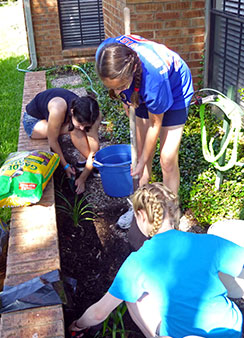
The lead paragraph of a story (“Youth poll results surface bright spots, concerns”) that reports on the poll results from the National Youth Gathering this past year notes, “For the first time in the history of the Lutheran Youth Fellowship (LYF) Youth Poll, youth ranked “environmental issues” among their top five concerns.”
A summary of the poll results prepared by Terry Dittmer (Director, LCMS Office of National Mission – Youth Ministry) entitled, “2013 LYF Youth Poll Offers Some Surprises,” also noted “Adults taking the survey ranked “Environmental Issues” as the number one concern at 50%.”
Here are the rankings of the concerns expressed by more than 2400 youth who participated in the poll:
- “Friends” (32.8 percent)
- “College” (28.5 percent)
- “Environmental Issues” (26.6 percent)
- “My Faith” (25 percent)
- “Family Relationships” (22.7 percent)
Interestingly, “environmental issues” is the only one of the five concerns that is not directed to their own selves but is directed more “outward” toward the wider world.
So, what might we take away from this? One might conclude that concern for the environment is simply the result of being bombarded with the issue the schools. And maybe it is is to some extent. Yet, most of the youth noted that their families do things like recycle (59.8% do so all the time with another 28.4% recycling sometimes). So it is something that they are learning at home as well. But regardless, even if it were an issue pushed by the schools and the culture, does that mean how we value God’s creation and our treatment of it should not be a valid concern for Christians? We need to reclaim first article theology for our young people. And we have good reasons for doing so.
Theologically, our church body has boldly and strongly affirmed the doctrine of a special creation by God over and against all ancient and modern rejections of it. Does it not follow that since God made this world, that He created us as part of it, made us for life within it, and gave us responsibility for its well-being (it was after all, the first commission God gave Adam and Eve) make this an important concern for us? Moreover, the death and resurrection of the incarnate Christ has established his lordship over creation to bring about its final renewal. Does not that further make it a vital interest for us? As Christians who by faith actually know the Creator through his revelation in Jesus, ought not our eyes and ears be uniquely attuned to the ways in which the heavens even now declare the glory of God, and the skies proclaim His handiwork?
Pastorally, shouldn’t the church take seriously these concerns of our youth and young adults by showing that it cares about what they care about? Doing so might open up conversations about how such concerns are connected to their faith. My daughter in Baltimore has pointed out that many see concern for the environment as important, but don’t know why because they don’t see it within a larger story. The church can help them see how those concerns are set within God’s grand story. In doing so, the church can help them celebrate God’s act of creating, delight in His marvelous creation (even as it groans in bondage to corruption), and see the hope we have in Christ for its ultimate renewal. From this story the church can empower our young adults to become involved in the ministry of the church within the larger community.
Editor’s Note: If you’d like to get a head start on integrating First Article concerns in your congregation’s ministry, check out these resources from Concordia Seminary’s Center for the Care of Creation, led by Dr. Arand.

Leave a Reply
You must be logged in to post a comment.